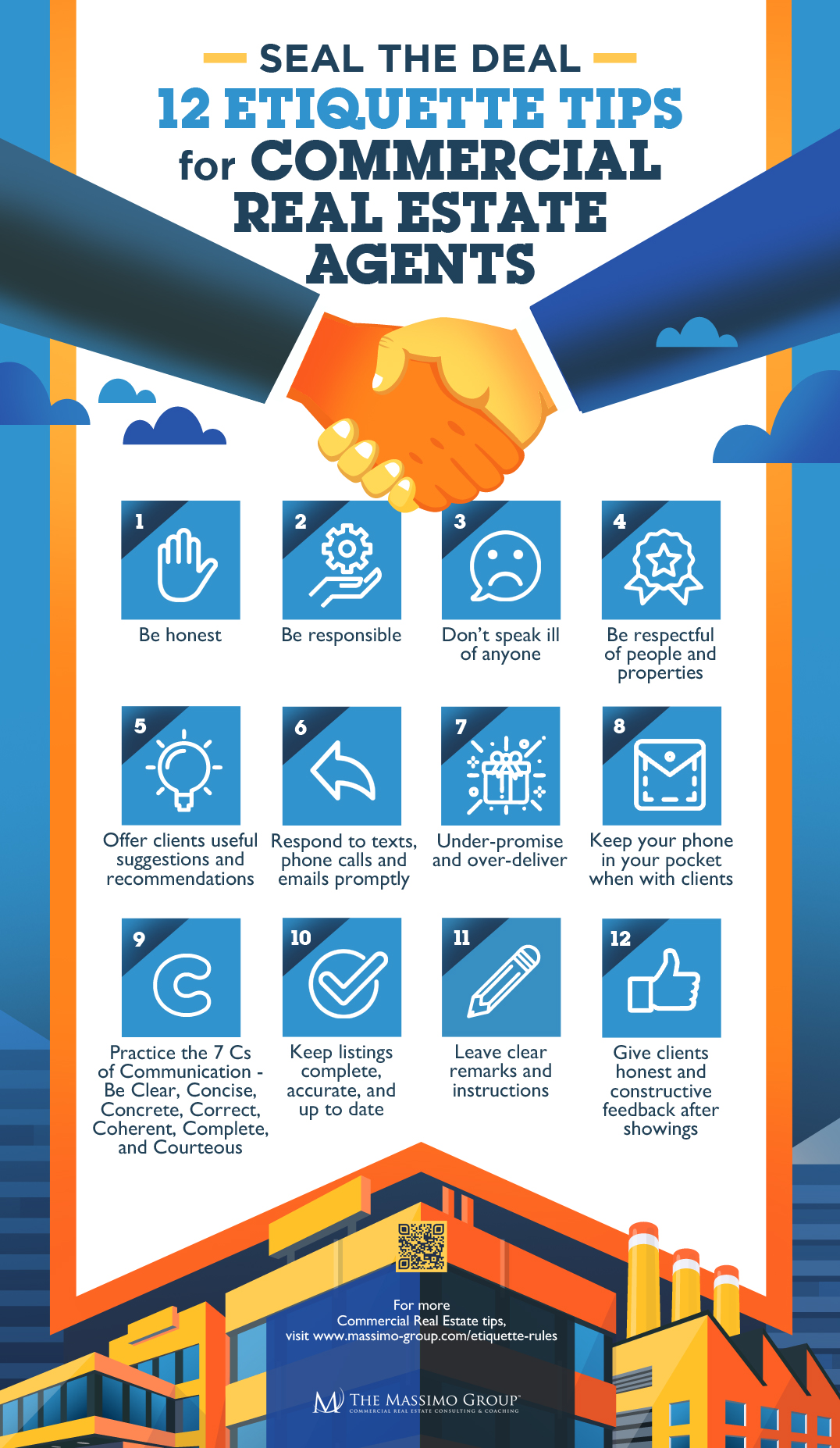Knowing proper etiquette can either make or break a CRE deal. Impress your clients and colleagues with these 20 essential etiquette rules in commercial real estate.
In this article:
- Honesty is the Best Policy
- Know Your Boundaries
- Communicate Properly
- Don’t Speak Badly About Colleagues
- Don’t Judge Clients by How They Look
- Be Kind to One Another
- Acknowledge Your Mistakes
- Respond to Texts, Emails, and Calls Promptly
- Exceed Expectations
- Adopt Clients’ Tonality and Language Style
- Don’t Hide Defects Under a Rug
- Be Transparent About Fees
- Arrive Early
- Update Property Listing Information
- Notify Clients and Colleagues When You’re Going on a Vacation
- Don’t Touch Your Colleagues or Clients
- Don’t Overwork Your Agents
- Work Out Differences Before Involving Others
- Look the Part
- Always Keep Your Calm
20 Important Etiquette Rules in Commercial Real Estate
1. Honesty is the Best Policy
Integrity and honesty are priceless. Always remember that money is easy to regain, but your clients’ respect and trust for you are far more important than income.
Your goal shouldn’t be to make as much money off a deal as possible. Rather, you should create a steady network of clients who trust and respect you.
2. Know Your Boundaries
CRE brokers must learn to find the professional line that separates them from their clients.
While we want to get on their good side, you must know how to separate work from play. Going over your professional boundaries might complicate things instead of sweetening the deal up.
But you don’t need to be too stiff either. A little bit of charm and friendliness are important if you want to maintain a solid stream of repeat clients.
Connect with them on a personal and relatable level but keep the level of professionalism intact in your conversations with them.
3. Communicate Properly
In commercial real estate, misunderstandings can break any deal, no matter how long you’ve been working with each other. To avoid unnecessary conflicts, make sure to communicate consistently and effectively with your clients.
Don’t be afraid to ask for clarification when you don’t understand what they’re trying to say. Similarly, make them understand that it’s okay to ask as many questions as they want about your proposal.
A few extra minutes answering simple questions is a simple yet effective way to lessen work-related arguments and misunderstandings.
4. Don’t Speak Badly About Colleagues

Commercial real estate can sometimes be a very relationally challenging industry. Several brokers compete for the same client’s attention by offering them different deals.
While you’d want to win the client for yourself, never ever bad-mouth the competition. It is unbecoming of a professional to do so.
It might earn you the revenue you want, but it will also ruin your reputation. How you talk about other people behind their back says a lot about your character.
Think about it: why would a client work with a broker who keeps saying bad things about their colleagues in the industry?
Clients would always choose the CRE professional with a sense of etiquette who tries to impress them with outstanding property offers, not by gossiping and talking trash about the competition.
5. Don’t Judge Clients by How They Look
As wrong as it may be, it’s very common to discriminate a client by just their looks when prospecting. CRE brokers give special attention to those with an impressive background and do not give as much attention to clients who appear to not have as much money.
However, CRE brokers should entertain all their clients equally, no matter how much they earn or what deal they’re signing into.
If you can’t help but treat high-ticket clients a little better, then do so without making your other clients feel left out. Otherwise, all your “low-ticket” clients might leave you for another broker with a better sense of business etiquette.
6. Be Kind to One Another
Commercial real estate deals rely heavily on personal interactions. Whether you’re dealing with agents or clients, always remember that a bit of kindness can go a very long way.
Don’t hesitate to do small good deeds, as long as they’re coming straight from the heart. A few brownie points may just be what you need to build a solid network of agents and clients who feel comfortable working with you.
Note: While you’d want to do acts of kindness for your colleagues and clients, remember to maintain your professional boundaries. As we said, one of the most important rules of business practice is to know how to separate your work and personal matters from each other.
7. Acknowledge Your Mistakes
Man is prone to error. No matter how long you’ve been in commercial real estate, you’re bound to commit a few mistakes every now and then.
You can never truly achieve a perfect record with zero production errors. What you can do is acknowledge your mistakes and take responsibility for them.
Instead of blaming your colleagues, peers, or clients, take responsibility and try to fix them right away. Nothing’s worse than an incompetent CRE broker who keeps blaming others for their errors.
8. Respond to Texts, Emails, and Calls Promptly

How ironic is it that one of the most well-known rules of business etiquette is also the one CRE brokers often forget? It’s just proper to respond right away to clients and colleagues who are waiting on the edge of their seats for an update on a real estate deal that costs over six digits.
Try to respond to texts and emails as soon as you can. If you get a call during a bad time, make sure to call their number back and do a quick apology explaining why you weren’t able to take their previous call.
The same etiquette rule applies when working with colleagues as well. Just because they’re not your clients doesn’t mean you should treat them any less.
9. Exceed Expectations
One of the most common problems involving CRE deals is when the broker fails to meet the client’s expectations. This could be the result of poor communication or mismanaged expectations, among other factors.
A good way to avoid disappointing your clients is to manage their expectations by keeping your promises grounded with the knowledge that you can deliver beyond it. By doing so, it won’t be as messy if the deal doesn’t end the way you initially thought it would.
Of course, this doesn’t give you a free pass to under-deliver every single time. After setting their expectations, do your very best to deliver above and beyond what you promised.
Always strive to give your clients the best deals you possibly can.
10. Adopt Clients’ Tonality and Language Style
Clients would feel more comfortable around people who speak the same way they do. What you can do is to try mimicking how they talk.
Take note of what words they commonly use and what tone they’re using. You wouldn’t want to shout enthusiastically at someone who’s clearly calm and collected, right?
Also, try to avoid swearing. Basic manners and etiquette dictate that it’s rude to swear during formal or professional deals.
While you have the freedom to say what you want, keep in mind that not everyone is comfortable with potty-mouthed people. You wouldn’t want to offend anyone with your swearing.
RELATED: 9 Ethical Principles Every Broker Should Know
11. Don’t Hide Defects Under a Rug
You can take this etiquette rule literally and figuratively. If you’re aware of any defects in your real estate property, make sure to tell your clients and agents about it.
It’s much easier to fix these types of problems from the get-go rather than delaying them for too long. Nobody wants to work with a CRE broker who doesn’t fully disclose property defects.
12. Be Transparent About Fees

Nothing disappoints customers more than undisclosed charges during the payment process. It’s common business etiquette to practice transparency during any type of negotiation that involves money.
Make sure to break down exactly where their money went. You’d want to assure them that every single penny they shelled out was for the real estate deal they signed into.
Plus, this is a surefire way to prevent any arguments during the billing and payment process. Always keep the copies of any contracts or receipts you give your clients.
13. Arrive Early
Keep in mind that the person you’re meeting set aside some time from their busy schedule to meet up with you. Punctuality shows a person how you value and respect their time and effort in meeting with you.
Whether you’re meeting with a client or a colleague, always strive to make it on time or if possible, earlier. If you have no choice but to cancel an appointment, make sure to notify them at least a few hours beforehand.
14. Update Property Listing Information
In commercial real estate, every second counts. You can’t afford to waste other people’s time by failing to promptly update your listing info.
Make sure to inform all potential clients if a piece of commercial property is no longer available. Also, make sure to inform and update your agents on your available rental property pieces.
Not doing so can lead to major disappointments for both their clients and your agents.
15. Notify Clients and Colleagues When You’re Going on a Vacation
Everybody needs some time off to go on a vacation. But before you start spraying suntan lotion on your face, make sure to notify your colleagues and clients about your time off from work.
It’s a common rule of etiquette to advise all parties you work with before you go away on a trip.
Tell your secretary or agents to handle all business calls and emails while you’re away. Just because you’re on vacation doesn’t mean the whole business should stop operating, right?
Tell them to contact you only if there’s an emergency they can’t handle on their own. Of course, once you get back to the office, make sure to set aside some time to catch up on everything that you missed out on.
16. Don’t Touch Your Colleagues or Clients

Avoid touching your clients and colleagues while you’re talking to them, even if they’re the type that seem comfortable with it. What seems like a harmless tap on the shoulder for you might be some form of something else to them.
Try to keep it professional by taking note of your gestures and how you interact with the people you deal with.
17. Don’t Overwork Your Agents
Every CRE broker in the country wants to make money, but you can’t create impossibly high quotas for your agents to meet.
If you want your business to succeed, make sure to set realistic goals and train your agents properly to hit their target. Rather than forcing them to meet the numbers you want, show them the ins and outs of the industry and how they can thrive.
18. Work Out Differences Before Involving Others
Since CRE deals depend on personal interactions, there are bound to be a few spats here and there.
Work out your differences with clients or colleagues first. If it doesn’t work out, you may ask someone with a neutral stance to help both of you sort things out and come to a resolution.
19. Look the Part
One important etiquette rule in sales is to look and dress nicely. You can’t expect people to trust a salesman who looks like a slob, right?
Take a shower, use nice-smelling cologne, wear suits that fit you, and shine your shoes.
20. Always Keep Your Calm

No matter how heated an argument becomes, never raise your voice, much less your fist, against someone you’re working with.
Don’t let emotions get the best of you. Take a step back and breathe first then assess the situation before acting on it.
Don’t forget to download, save, or share this handy infographic for reference:

Check out this video about the 20 etiquette tips for commercial real estate brokers:
These are just some of the common etiquette rules CRE brokers need to keep in mind. Overall, the important thing is to treat the people around you the way you’d want them to treat you.
Become someone people would genuinely want to work with. A bit of respect, kindness, and sincerity may just be what you need to take your CRE business to the next level.
Get known, connect instantly, and win more business! In this webinar session, Bo Barron will show you how presence, a great value proposition, and a targeted prospecting campaign can grow your business without chaos! You can watch the webinar here.





